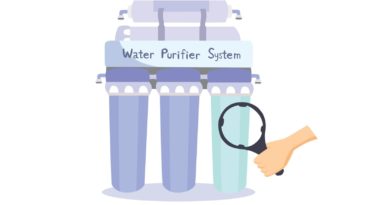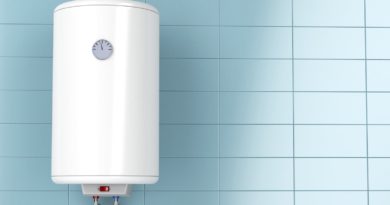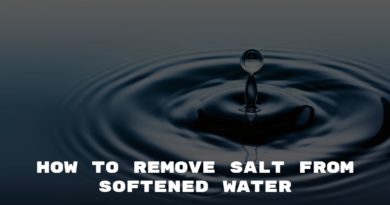Best Water Softener For Your House
**Articles may contain links that I earn compensation for if clicked and you make a purchase. As an Amazon Associate, I earn from qualifying purchases. These earnings do not actually impact the price of the product or service.
Hard water. I know it sounds absolutely ridiculous, but it is actually a thing. Hard water does not necessarily cause harm to your health, but in high concentrations, it can damage your appliances. Whole house water softener systems are a pretty big investment, which makes choosing one especially hard. There are many factors to consider when making your purchase. In this guide, we hash out all the details so you can choose the best water softener for your house.
Table of Contents
Hard Water
Hard water is water that has a high amount of dissolved compounds. These include calcium, magnesium, and other minerals. A high amount is usually measured by grains per gallon (gpg). Anything over 7 gpg is classified as hard water.
Problems with Hard Water
It may not seem like a big problem, but at high rates, the compounds can break down your appliances or cause other small nuisances. Hard water can cause a variety of different negative effects, such as:
- Damage- The compounds in the water can start to build up in the pipes and decrease the flow of water. They mix with soap or other substances that form a curd, which blocks the pipes. When water sits for long periods, the minerals stick and stay stuck to the internal surfaces.
- Skin Irritation- At high concentrations, hard water can affect your skin, especially with those with sensitive skin. Hard water contains a high pH and a high mineral content, which can aggregate existing skin conditions or cause them. Some skin problems that could occur as a result of this include itchiness, dryness, or clogged pores. It often worsens pre-existing conditions such as eczema and can also irritate the scalp after long periods of use.
- Stains- Hard water can also create stains on your surfaces when washing. Have you ever noticed a gray film or spots when washing your glassware? This is a telltale sign that your home has hard water. The minerals in the water also break down the basic pH of soap and detergent. This forces you to use extra materials and force in order to get your surfaces clean.
- Decreased Efficiency- Hard water can also affect your water-using appliances. Since the minerals build up over time, the efficiency is decreased and may cause you to replace damaged pipes.
Benefits of Using a Water Softener
There are many benefits to using a household water softening system. Some of these reasons include:
- Less Scaling- A water softener decreases the amount of buildup and limescale on the pipes. This allows your appliances to last longer without replacing them.
- Residue-Free- Soft water does not leave a foul residue. This helps to decrease leakage and extend the life of your appliances.
- Smoother Hair- Hard water tends to dry out the scalp and hair, making it look dull.
- Healthier Skin- Soft water has a better pH balance for your skin, which leads to less irritation.
- Softer Clothes- Soap mixes with the minerals in hard water and dries out your clothes. Soft water helps to soften your clothes and allow them to last longer with washes.
- Clean Cookware- With soft water, you do not need to worry about spots or a gray film on your surfaces. This helps you ensure that your eating utensils are clean and presentable for guests.
- Higher Efficiency- Soft water runs smoothly through your pipes.
How a Water Softener Works
A water softening system works to reduce the minerals in your water. It is usually located where the water enters the house for indoor usage. Since the water for irrigation is less important, the system works towards softening the water for indoor use. The system features porous plastic resin, which is covered with molecules. These specific molecules bind to the calcium and magnesium ions that are in the hard water. The system needs to be rinsed in order to stay effective. To rinse it, the resin must be washed with a saltwater or sodium chloride solution to unbind the calcium and magnesium ions.
There are different sizes for water softening systems. The amount of calcium and magnesium the unit can remove is determined by the cubic feet of resin it has. One cubic foot is said to remove around 3000 gallons of hard water.
How to Choose a Water Softener
To find the system that is best for your house, you need to first determine how hard your water is. There are tools to estimate or precisely measure the hardness of your water.
- Sizing- This usually depends on how much water is used in the home. The system is installed at the point of water entry, so you want to make sure the system isn’t too big or small for your water needs.
- Regeneration- This is the process when the minerals are washed off. A good time grams is around once every 3-4 days. Regenerations waste a bit of water so it is important for it not to occur too often.
- Price- The typical price for a water-softening system ranges anywhere from $500-$3000 depending on the size and features. You also need to take into account the softening salt, regeneration water costs, and monthly maintenance costs. In general, higher-grain water softeners are more expensive than low-grain water softeners since they work more effectively in reducing hardness.
- Additional Features- Some other features to look for include cross-linking, automatic features, and higher standards. Cross-linking resin lasts longer. Automatic features help to decrease maintenance and make your life easier.
- Installation – If you are fairly handy with sweating copper or working with PVC, you can likely install a water softener yourself.
- An alternative to a water softener that still produces soft water is a Reverse Osmosis (RO) system.
Top Picks for Whole Water House Softener
Household water softeners are a large investment so it is that much more important to choose a high-quality system that works effectively.
Whirlpool Pro-Series Whole Home Filter (Gray)
The Whirlpool Pro Series home filter works for families of up to five people with one tank system. It also features superior hardness removal with a 31,000-grain capacity. It is higher than the average system and is able to remove 120 grains per gallon. A great feature of this system is the smart water softener. The system uses technology to determine the regeneration needs, which helps to reduce the amount of salt needed. It also regenerates depending on your water usage instead of a timer. This is also a hassle-free system with a self-cleaning filter. With this product you do not need to worry about changing the filter. A great added feature of this system is that it is NSF Certified, which means that it complies with strict standards, which increases the safety of the model.
Pros:
- Easy to install
- NSF certification for higher performance
- Newer regeneration technology
Cons:
- Uses up salt quickly
- Hard to properly clean intricate parts
Whirlpool Water Saving Softener
This unit is similar to the Pro Series model, but is more optimal for households up to 4 people. It also has a 30,000-grain softener that works to clean water up to 8 ppm. Like the other Whirlpool model, this one is NSF Certified, which gives you that added assurance that this product has higher health standards. It also has the same technology used to determine when the system needs to regenerate. This is a great option for those with fewer people in the family since the capacity is slightly lower and the price is more affordable.
Pros:
- 1-year warranty for a better guarantee
- Impressive 30,000-grain removal
- NSF Certified to fit standards
Cons:
- Slightly smaller capacity
- Installation instructions can be hard to follow
Whirlpool 40,000 Grain Water Softener
This Whirlpool model has a 40,000-grain model, which is more effective in removing the hardness. These models are usually more expensive, but this one is actually slightly less than the pro series model since it has less added features. This system works for households of up to 6 people. This system is capable of removing water iron up to 11 ppm, which is more extensive than the other two. It also comes with a low salt light indicator, which helps you easily determine when you need to add more salt. The water softener system is able to remove calcium, magnesium, and iron.
Pros:
- Able to accommodate families up to 6 people
- 40,000-grain model is effecting and quick in reducing hardness
- Indicator makes it easy to see
Cons:
- Does not remove chlorine or sediment
- Contains plastic clips to hold valves
Fleck Metered On-Demand Water Softener
The Fleck system is a 48,000-grain water softener that comes with a brine tank and bypass control valve. The meter is easy to read and also uses a scan and service app to let you easily get access to important information. The tank is made from a high capacity resin that extends the life of the product. The system includes a metered regeneration process that only regenerates when it needs to. A great added feature of this softener is the safety float, which prevents overfilling.
Pros:
- Added features add to value
- High grain water softener for efficiency
- Meter system for decreased regeneration
Cons:
- Hard to install
- Comes with multiple parts
GE Appliances 30,400 Grain Water Softener
The GE Appliances Water softener has a 30,400-grain capacity that is great for households of up to five people. It is able to remove up to 95 grains per gallon to provide you with better quality soft water. A great feature that sets this system apart is the sleek one component design and electronic controls. The controls are easy to read and adjust. It also shows a unique days-to-empty feature that lets you know when the salt needs to be refilled. It is easy to use and install for any level of user.
Pros:
- Electronic controls that easily inform you
- Easy to set up
- Great efficiency for the price
Cons:
- No sediment filter
- Slightly lower capacity
Conclusion
A home water softening system can greatly improve the quality of your life. They are a minimal investment that requires more consideration to include how to install one and making sure you are performing maintenance properly on your water softener. Hopefully, this guide can help you determine the features and capacity that you need for your household.


